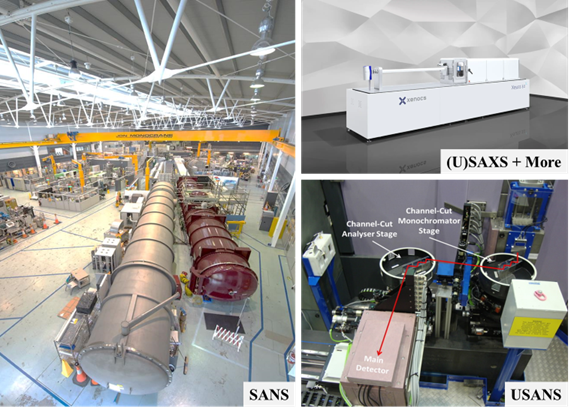School Seminar: Dr Jitendra Mata, ANSTO
Friday, 6 October 11:00am – 12:00pm
This seminar will be delivered in Lecture Theatre 2
Speaker: Dr Jitendra Mata, ANSTO
Host: Professor Gregory Warr
Title: Structural characterisation of complex materials: Case studies using Small and Ultra Small Angle Scattering at ACNS, ANSTO
Abstract: Small angle X-ray and neutron scattering (SAXS, SANS, ultra-SANS) are versatile techniques for investigating the nanoscale and microscale structure of hard and soft condensed materials such as minerals, alloys, magnetic materials, food, surfactants, polymers, proteins, colloids, and emulsions. These techniques have been exceptionally useful for studying complex materials with hierarchical structures in recent years. The use of small angle scattering (SAS) in combination with traditional techniques offers a unique insight into the structure, size, shape and morphology of materials. Different processes like aggregation, structural transitions, crystallisation, porosity, and phase separation can be directly studied using SAS. SAS techniques are well-established for characterisation at the 1 nm to 10 µm length scales, are mostly nondestructive, and particularly useful to study systems, in-situ, and within complex sample environments. The use of deuterated molecules and partial deuteration has also enhanced the applicability of these methods for soft materials using SANS/USANS. We discuss the advantages and limitations of these techniques and provide examples of recent applications in various areas of science in this talk.
Australia is the home of state-of-the-art reactor-based SANS and USANS instruments known as Quokka, Bilby, and Kookaburra (at the ACNS, ANSTO). Combining these with on-site lab based SAXS instrument provides a versatile characterisation suite to study complex materials especially for industrial applications. ANSTO is known for its high-class neutron scattering based science, and associated exceptional sample environment options, as well as outstanding deuteration facility.

Bio: Dr Jitendra Mata is a principal instrument scientist for the Kookaburra an Ultra Small Angle Neutron Scattering (USANS) instrument (since March 2017) and an instrument associate for the Quokka a Small Angle Neutron Scattering (SANS) instrument (since July 2018) at Australian Centre for Neutron Scattering (ACNS), Australian Nuclear Science and Technology Oranisation (ANSTO), Australia. Dr Mata has been at ANSTO for > 14 years; working as an instrument scientist for the Quokka for 4 years, a research leader at ANSTO Minerals for 3 years, and as a postdoctoral research fellow at the ACNS for 2 years. He also worked as a postdoctoral research fellow at The Australian National University with Prof. John White for 3 years.
Dr Mata’s research concerns complex soft materials and has had industrial relevance since his PhD. He has investigated several areas of soft condensed matter science, such as surfactant and block copolymer solutions, emulsions, food proteins, hydrogels, and minerals. Dr Mata has co-authored more than 120 peer reviewed articles including 2 book chapters: all in high impact international journals. He has also published several scientific reports.
More information:
https://www.ansto.gov.au/people/dr-jitendra-mata
https://scholar.google.com.au/citations?user=_tFPHuEAAAAJ&hl=en
- Expert (21+ years) of soft matter (colloids and interface, hydrogels, emulsions, surfactants, block co-polymer, food proteins) science.
- Experienced scientific supervisor and research manager (12+ years).
- Expert of USANS, SANS, USAXS, SAXS (Ultra-Small and Small Angle X-ray and Neutron Scattering techniques, nano and micro scale characterisation); colloid science techniques; and various classical and advanced analytical techniques.

